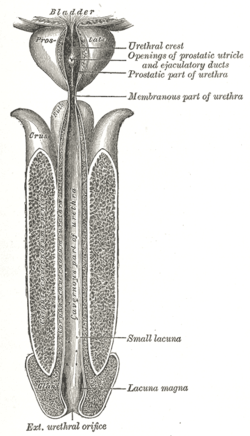Urethral stricture
Editor-In-Chief: Prab R Tumpati, MD
Obesity, Sleep & Internal medicine
Founder, WikiMD Wellnesspedia &
W8MD medical weight loss NYC and sleep center NYC
| Urethral stricture | |
|---|---|

| |
| Synonyms | N/A |
| Pronounce | N/A |
| Specialty | N/A |
| Symptoms | Decreased urine stream, urinary retention, urinary tract infection |
| Complications | Bladder damage, kidney damage, urinary incontinence |
| Onset | Any age, more common in males |
| Duration | Chronic |
| Types | N/A |
| Causes | Injury, infection, surgery, catheterization |
| Risks | Trauma, sexually transmitted infections, prostate surgery |
| Diagnosis | Cystoscopy, retrograde urethrogram, urine flow test |
| Differential diagnosis | Benign prostatic hyperplasia, urethral cancer, urinary tract infection |
| Prevention | N/A |
| Treatment | Urethral dilation, urethrotomy, urethroplasty |
| Medication | Antibiotics for infection |
| Prognosis | Variable, depends on severity and treatment |
| Frequency | More common in males, rare in females |
| Deaths | N/A |
Narrowing of the lumen of the urethra.
Causes of urethral stricture
- Scar tissue from surgery.
- Infection
- Injury
- Tumor
Other factors
- Sexually transmitted infection (STI)
- Urethral catheter or cystoscope
- Benign prostatic hyperplasia (BPH)
- Injury to the pelvic area
- Repeated urethritis
Symptoms
- Blood in the semen
- Discharge from the urethra
- Bloody or dark urine
- Strong urge to urinate and frequent urination
- Inability to empty bladder (urinary retention)
- Painful urination or difficulty urinating
- Loss of bladder control
- Increased frequency or urgency to urinate
- Pain in the lower abdomen and pelvic area
- Slow urine stream (may develop suddenly or gradually) or spraying of urine
- Swelling of the penis
Physical examination
- A physical exam may show the following:
- Decreased urinary stream
- Discharge from the urethra
- Enlarged bladder
- Enlarged or tender lymph nodes in the groin
- Enlarged or tender prostate
- Hardness on the under surface of the penis
- Redness or swelling of the penis
- Sometimes, the exam reveals no abnormalities.
Investigations
- Cystoscopy
- Postvoid residual (PVR) volume
- Retrograde urethrogram
- Tests for chlamydia and gonorrhea
- Urinalysis
- Urinary flow rate
- Urine culture
Treatment
- The urethra may be dilated during cystoscopy.
- An open urethroplasty may be done for longer strictures.
- If no other treatments work, a urinary diversion called an appendicovesicostomy (Mitrofanoff procedure) or another type of surgery may be done. This lets you drain your bladder through the wall of the abdomen using a catheter or a stoma bag.
Prognosis
- The outcome is often excellent with treatment.
- Urethral stricture may totally block urine flow.
Prevention
- Practicing safer sex may decrease the risk of getting STIs and urethral stricture.
- Treating urethral stricture quickly may prevent kidney or bladder complications.
| Diseases of the urinary tract | ||||||||
|---|---|---|---|---|---|---|---|---|
|
Transform your life with W8MD's budget GLP-1 injections from $125.
W8MD offers a medical weight loss program to lose weight in Philadelphia. Our physician-supervised medical weight loss provides:
- Most insurances accepted or discounted self-pay rates. We will obtain insurance prior authorizations if needed.
- Generic GLP1 weight loss injections from $125 for the starting dose.
- Also offer prescription weight loss medications including Phentermine, Qsymia, Diethylpropion, Contrave etc.
NYC weight loss doctor appointments
Start your NYC weight loss journey today at our NYC medical weight loss and Philadelphia medical weight loss clinics.
- Call 718-946-5500 to lose weight in NYC or for medical weight loss in Philadelphia 215-676-2334.
- Tags:NYC medical weight loss, Philadelphia lose weight Zepbound NYC, Budget GLP1 weight loss injections, Wegovy Philadelphia, Wegovy NYC, Philadelphia medical weight loss, Brookly weight loss and Wegovy NYC
|
WikiMD's Wellness Encyclopedia |
| Let Food Be Thy Medicine Medicine Thy Food - Hippocrates |
Medical Disclaimer: WikiMD is not a substitute for professional medical advice. The information on WikiMD is provided as an information resource only, may be incorrect, outdated or misleading, and is not to be used or relied on for any diagnostic or treatment purposes. Please consult your health care provider before making any healthcare decisions or for guidance about a specific medical condition. WikiMD expressly disclaims responsibility, and shall have no liability, for any damages, loss, injury, or liability whatsoever suffered as a result of your reliance on the information contained in this site. By visiting this site you agree to the foregoing terms and conditions, which may from time to time be changed or supplemented by WikiMD. If you do not agree to the foregoing terms and conditions, you should not enter or use this site. See full disclaimer.
Credits:Most images are courtesy of Wikimedia commons, and templates, categories Wikipedia, licensed under CC BY SA or similar.
Translate this page: - East Asian
中文,
日本,
한국어,
South Asian
हिन्दी,
தமிழ்,
తెలుగు,
Urdu,
ಕನ್ನಡ,
Southeast Asian
Indonesian,
Vietnamese,
Thai,
မြန်မာဘာသာ,
বাংলা
European
español,
Deutsch,
français,
Greek,
português do Brasil,
polski,
română,
русский,
Nederlands,
norsk,
svenska,
suomi,
Italian
Middle Eastern & African
عربى,
Turkish,
Persian,
Hebrew,
Afrikaans,
isiZulu,
Kiswahili,
Other
Bulgarian,
Hungarian,
Czech,
Swedish,
മലയാളം,
मराठी,
ਪੰਜਾਬੀ,
ગુજરાતી,
Portuguese,
Ukrainian
Contributors: Prab R. Tumpati, MD



